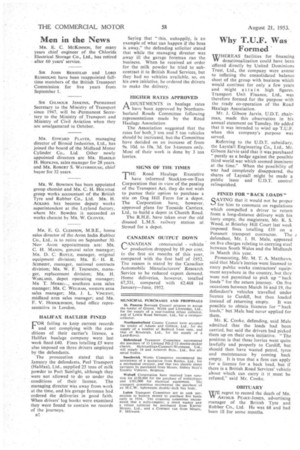Why T.U.F. Was Formed
Page 36

If you've noticed an error in this article please click here to report it so we can fix it.
WHEREAS facilities for financing denationalization could have been offered directly by. United Dominions Trust, Ltd., the company were averseto inflating the consolidated balance sheet of the group with business which would continue for only a few years and might attain high figures. Transport Unit Finance, Ltd., was therefore formed for the purpose with the ready co-operation of 'the Road Haulage Association.
Mr. J. Gibson Jarvie, U.D.T. chairman, made this observation in his annual statement on Tuesday. He added that it was intended to wind up T.U.F. when this company's purpose was served.
Referring to the U.D.T. subsidiary, the Laystall Engineering Co., Ltd., Mr. Gibson Jarvie said that it was purchased "purely as a hedge against the possible third world war which seemed imminent at the time." When the possibility of war had completely disappeared, the shares of Laystall might be made a public issue and U.D.T. control relinquished.
FINED FOR "BACK LOADS" QAYING that it would not be proper for him to comment on regulations which compelled a driver to return from a long-distance delivery with his lorry empty, the magistrate, Mr. K. S. Wood, at Brierley Hill Court last week imposed fines totalling £10 on a Pensnett transport contractor. The defendant, Mr. J. 11. Male, appeared on five charges relating to carrying steel between South Wales and the Midlands in March this year. Prosecuting, Mr. M. T. A. Matthews_ said that Male's lorries were licensed to carry public works contractors' equipment anywhere in the country, but they weft not permitted to pick up "back loads" for the return journey. On five occasions between March 16 and 19, the defendant's vehicles travelled under licence to Cardiff, but then loaded instead of returning empty. It was possible to obtain licences for "back loads," but Male had never applied for them. Mr. K. Cooke, defending, said Male admitted that the loads had been carried, but said the drivers had picked them up on their own initiative. "The position is that these lorries went quite lawfully and properly to Cardiff, but should then have wasted petrol, tyres and maintenance by coming back empty. It is true that a firm can apply for a licence for a back load, but if there is a British Road Services' vehicle about which can carry it it must be refused," said Mr. Cooke,




























































































